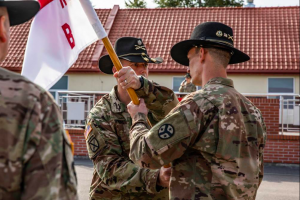
Attorney Paul Tennison accepting command of Battery B in Poland on August 15, 2019
A military discharge upgrade can be an important step in the life of a veteran who believes that he or she received a lower discharge than what was deserved. Various federal and state benefits are available only to veterans who were discharged at an acceptable level. The best discharge is an Honorable discharge, which should enable the veteran to access all benefits. General Discharge Under Honorable Conditions is the second highest level. Other Than Honorable Conditions Discharge is the third level, while a Bad Conduct Discharge is the fourth. Dishonorable is the lowest level of discharge and is reserved for those convicted of serious crimes while in the military. Veterans who receive a Dishonorable Discharge forfeit all benefits, cannot lawfully possess a firearm, and forfeit their right to vote. For more information about types of military discharges, you should refer to this article.1
Fortunately, U.S. federal law allows veterans to request a higher-level discharge through one of two record-correction boards. Within 15 years of discharge, veterans may apply to a Discharge Review Board (DRB) using form DD-293. Importantly, DRBs may not make a discharge worse nor can they overturn a court-martial decision. If a discharge occurred more than 15 years ago, a veteran can apply to the Board for Correction of Military Records (BCMR). Veterans should apply to the BCMR within 3 years of discovering the error or injustice they are asking the board to fix using form DD-149. BCMRs also cannot make a discharge worse or override a court-martial conviction.
 Cole Law Group Blog
Cole Law Group Blog



















 The Uniformed Services Employment and Reemployment Rights Act of 1994 (USERRA) is a federal law designed to protect the civilian employment of active, reserve, and national guard military personnel in the United States called to active duty.1 The three major purposes of USERRA are protection against discrimination, minimize disruption by providing for prompt reemployment, and protection of one’s pre-deployment job.2 The law clarifies that it is illegal for employers to discriminate against employees because of past, present, or future military service
The Uniformed Services Employment and Reemployment Rights Act of 1994 (USERRA) is a federal law designed to protect the civilian employment of active, reserve, and national guard military personnel in the United States called to active duty.1 The three major purposes of USERRA are protection against discrimination, minimize disruption by providing for prompt reemployment, and protection of one’s pre-deployment job.2 The law clarifies that it is illegal for employers to discriminate against employees because of past, present, or future military service The Uniform Code of Military Justice (UCMJ) is located in Chapter 37 of the United States Code.¹It is Federal law that applies to the U.S. Military. The UCMJ “defines the military justice system and lists criminal offenses under military law.”² On January 1, 2019, major changes to the Uniform Code of Military Justice took effect.³ According to the United States Army these changes include: “modernizing definitions for many offenses, adjusting maximum penalties, standardizing court-martial panels, creating new computer-crime laws, and much more.”
The Uniform Code of Military Justice (UCMJ) is located in Chapter 37 of the United States Code.¹It is Federal law that applies to the U.S. Military. The UCMJ “defines the military justice system and lists criminal offenses under military law.”² On January 1, 2019, major changes to the Uniform Code of Military Justice took effect.³ According to the United States Army these changes include: “modernizing definitions for many offenses, adjusting maximum penalties, standardizing court-martial panels, creating new computer-crime laws, and much more.”